
For most of us, the day starts with a hot cup of tea and sometimes ends with it too. And we justify the saying “anytime is tea time” with our love for this amazing beverage. If you have toddlers in your home, you might have noticed them getting interested in the contents of your cup and wanting to give it a try. So, what can you do as a parent when this situation comes up? Is tea for toddlers safe? Can you allow them to try tea once in a while? Are there any risks associated with giving tea to toddlers?
Tea is an extremely popular beverage, not only in India but the world over. Though some types of tea have multiple benefits for toddlers, you should consider a few things before offering tea to your kid. You must know about the types of tea that are good for them and how much or how frequently you can allow them to drink them. This article has everything you need to know before introducing tea to your little one.
In This Article
- Video Of Tea for Toddlers: What Every Mom Should Know
- Is Tea Safe For Toddler?
- Common Herbs Used For Preparing Tea For Toddlers
- Top 5 Health Benefits of Herbal Tea For Toddlers
- What Are The Side Effects of Herbal Tea For Toddlers?
- Precautions to Take While Using Herbal Tea For Toddlers
- What Are Some Alternatives to Herbal Tea?
- FAQ’s
Video Of Tea for Toddlers: What Every Mom Should Know
Is Tea Safe For Toddlers?

As parents, we avoid giving tea to toddlers, and avoiding it is recommended too. But when your stubborn toddler demands, you yield and give a small sip, which, later on, becomes a habit. Therefore, it is important to know the ingredients of the tea you are giving to your toddler. The black and green tea leaves contain caffeine, which is a stimulant and not recommended (1) for kids under 12 years of age. Such teas may cause sleep problems, increase urine output, and even decrease the level of sodium and potassium in toddlers.
Herbal teas (2) are considered safe and a good option for toddlers. These teas are generally free of caffeine. But before giving anything new to your toddler, it is better to check with their doctor first. Also, although herbal teas are generally considered safe, but you should limit the consumption to once or twice a week for your little one.
Common Herbs Used For Preparing Tea For Toddlers
Herbal teas are made from roots, seeds or leaves of a plant or herb. Hence, they are devoid of caffeine and do not have any stimulating effect on the kids. Although everything is available in market these days, it is better to make the tea at home for your toddler. Let us look at some of the best herbs to safely make tea for toddlers-
1. Fennel

Fennel or saunf can cure gastric problems, provide relief from gas pain, and is even beneficial in colic (3). It is also useful for cough and cold and gives relief from respiratory problems (4). But the root of this herb has a strong flavor and your child may not be keen to taste this. To make fennel tea, simply boil few fennel seeds in water and strain. Give this to your toddler to sip while its still warm.
2. Cardamom
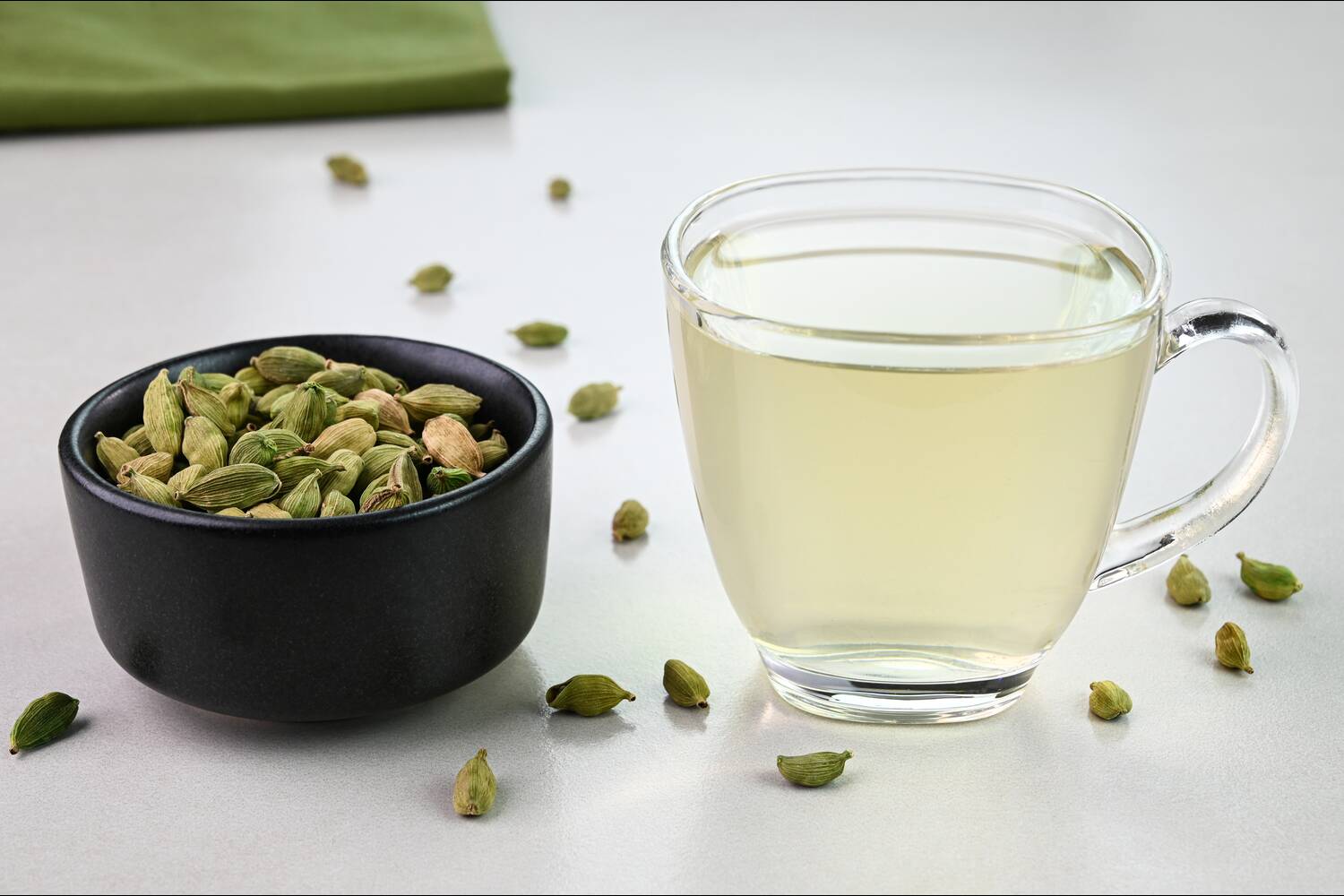
Cardamom or elaichi is an important part of any Indian kitchen. From tea to desserts, it makes an appearance in a variety of dishes. Cardamom tea is a popular beverage for adults. But, cardamom is also considered safe and beneficial for kids. A glass of warm water with cardamom pods or powder works amazingly for headaches, common cough and cold, digestion problems (5), and stomach pains. You can make cardamom ‘tea’ for your little one by boiling 1-2 pods of green cardamom in water.
[Read: 10 Ways to Treat Cough and Cold in Babies with Ginger]
3. Ginger

Ginger is a common kitchen ingredient, and we all know the good properties of this root. According to research (6) ginger is considered safe for kids. It helps to improve digestion. It has an amazingly positive effect on nausea and vomiting (7). The anti-inflammatory properties of this root are helpful for kids who suffer from indigestion and related issues. Though it has numerous health-good properties, the spicy flavor may not attract your toddler. Too much ginger can cause heartburn problems and must be avoided. To prepare ginger tea, you can add grated ginger to a cup of boiling water, add some honey (8), and lemon juice for flavor and serve it to your little one.
4. Chamomile

This herb is used as a calming agent and also has anti-inflammatory properties (9a). Chamomile tea is good for the digestive system (9b). Moderate consumption helps relieve stomach pain, improves the functioning of the digestive system, resolves gastric issues, and promotes sound sleep (9c). It also boosts body immunity (9d). It has a mild flavor as it comes from the floral part of the plant. Watch out for any allergic reactions from drinking this tea.
[Read: Chamomile Tea for Babies]
5. Mullein
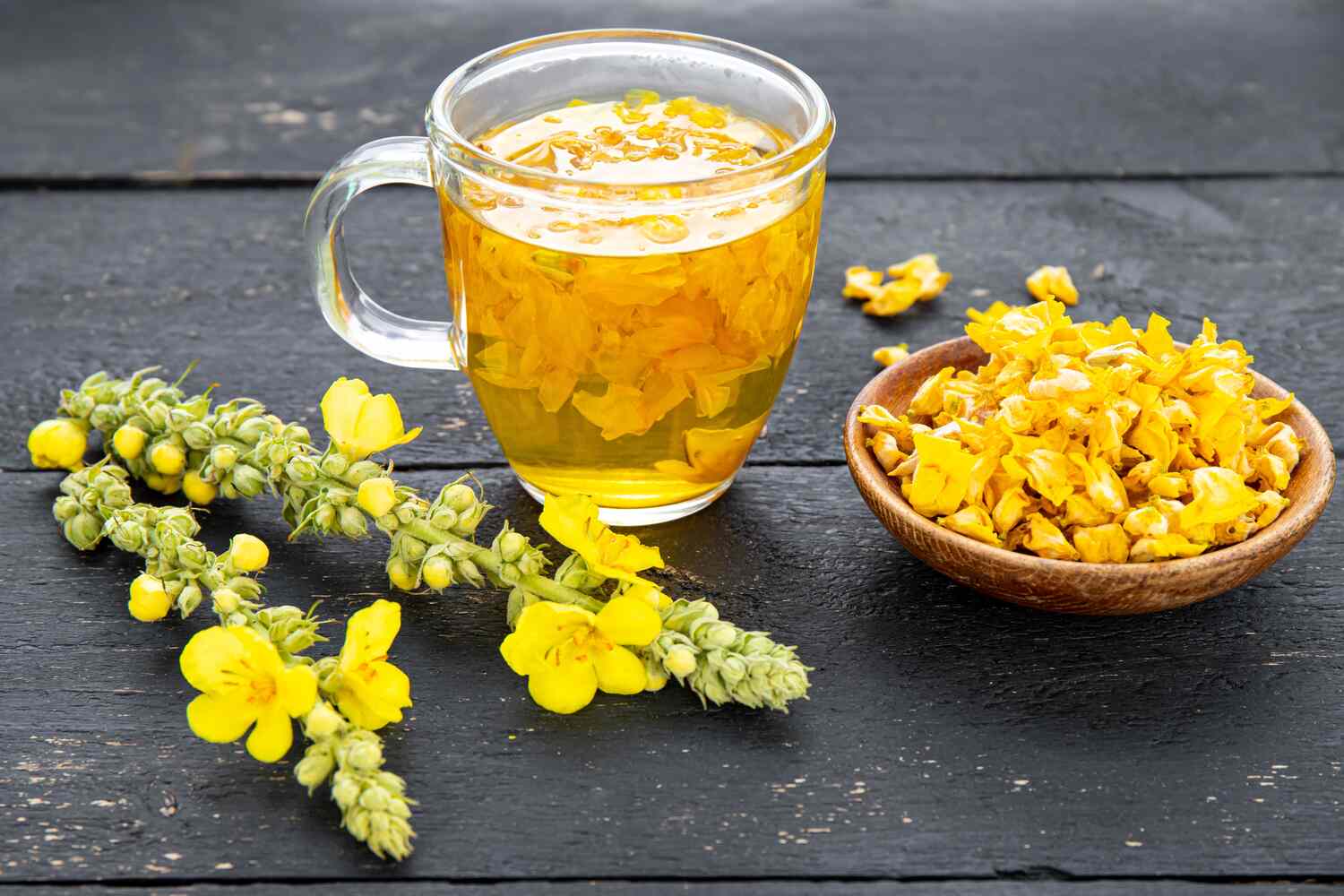
This popular herb can cure many seasonal and common diseases (10) like cough and cold, seasonal fever, diarrhea, and bronchitis (11). It is found in a flowering plant that grows in Asia, Africa, and Europe. It is famous for its beautiful aroma and rich taste. Mullein tea can also be used to get relief from stomach related ailments like diarrhea and indigestion (12).
6. Peppermint

Peppermint (13)is very useful for preventing some irritating seasonal problems like upset stomach, nausea, bad bowel movement, common cough, and cold, and is even used as a stress-relieving agent. You can give peppermint tea to your toddler in the evening to rejuvenate them and boost their energy level. If your toddler has a persistent cough (14), then also you can give peppermint tea in evening to ensure they get some relief and a sound sleep. Although there have been no reports on any sort of adverse effects (15) to drinking peppermint tea, it is always better to consult the doctor before introducing any new food item in your little one’s diet.
7. Lemon Balm
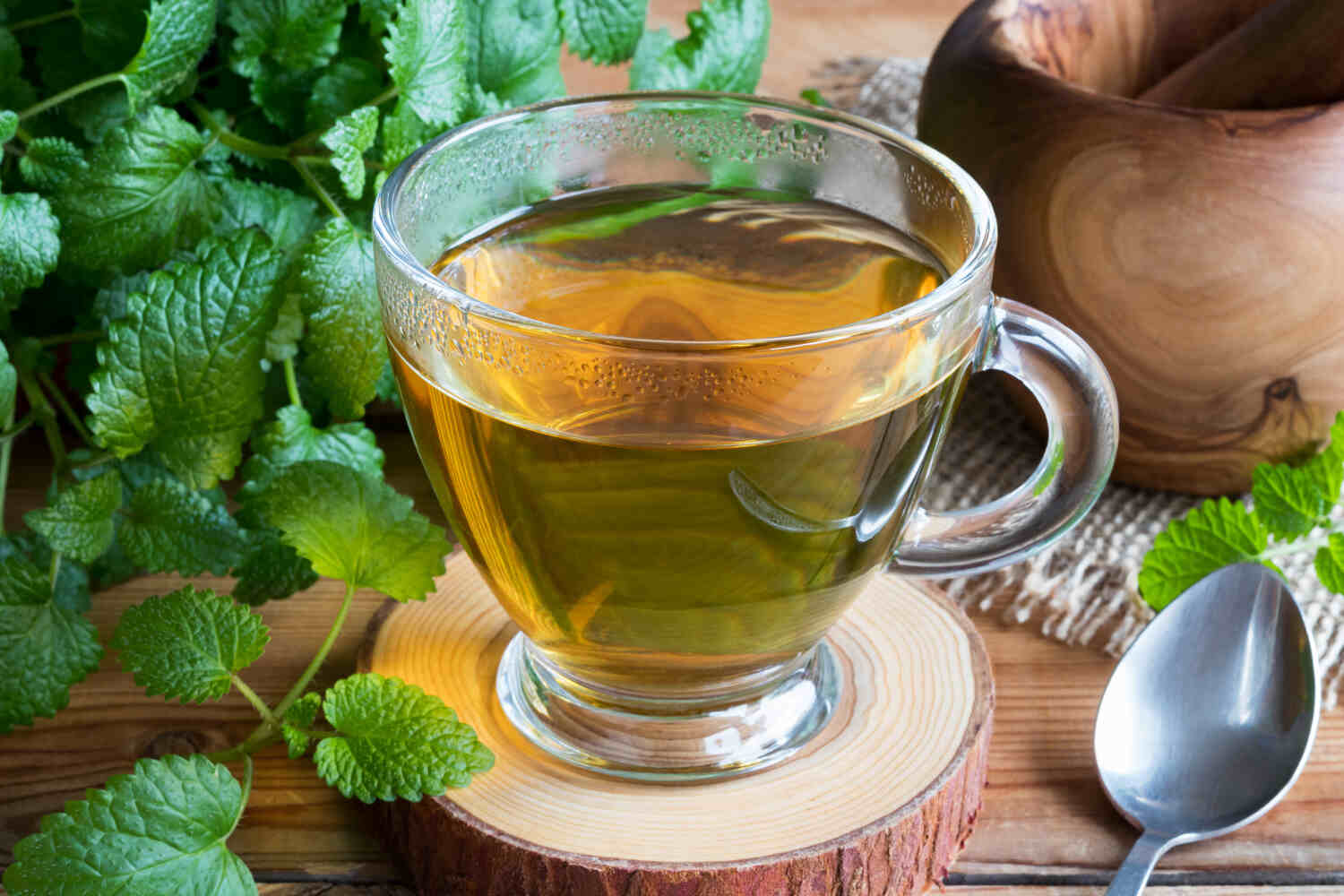
Lemon balm is very beneficial for your kid. As the name suggests, it has a lemony flavor, and the aroma is also very soothing. According to a naturopathic doctor (16) lemon balm is safe for kids. Lemon balm tea often helps with better sleep (17) and reduces anxiety. The antiviral properties of this herb make it excellent for treating seasonal viral fever and cough effectively.
Top 5 Health Benefits of Herbal Tea For Toddlers

Tea is an amazing beverage for adults, and it also brings some great benefits. But you must be curious about what are the benefits of herbal tea for toddlers. Let’s check these out-
1. Good For Gastric Problems
Some types of herbal teas provide relief from stomach-related problems in toddlers. Fennel tea in moderation can be beneficial for toddlers suffering from gastric issues.
2. Fights Against Common Cough And Cold
Herbal teas are a natural remedy for common cough and cold in toddlers. Moderate consumption of lemon tea, cardamom tea, and mullein tea shows good results in providing relief from seasonal cough and cold.
3. Improves Digestion
Babies often suffer from indigestion problems. Teas made with herbs like ginger improve digestion and regularize bowel movement.
4. Anti-Inflammatory Properties
Some herbal teas have anti-inflammatory elements which help your toddlers with inflammation and pain-related issues.
5. Promote Better Sleep
Herbs are considered an excellent remedy to manage sleeping disorders in adults as well as children. Moderate consumption of lemon balm tea and peppermint tea promotes good sleep and keeps your toddler active.
What Are The Side Effects of Herbal Tea For Toddlers?
As we discussed, herbal tea does not contain any caffeine. But that does not mean that this tea is side-effect-free. There is no clear evidence or report which illuminates the side effects of tea made of herbs. Herbal teas may not be suitable for children below 2 years of age. Look out for allergic reactions when you introduce your toddler to anything new, including a new herbal tea.
[Read : 15 Must Have Super Foods For Your Toddler]
Precautions to Take While Using Herbal Tea For Toddlers

Prevention is better than cure, and this applies to giving tea to your toddler as well. You should take a few precautions before giving herbal tea to your little one.
1. Expert Consultation
As there is no clear evidence of side effects of herbal tea for toddlers, it is always better to consult your doctor before giving herbal tea to the little champ.
2. Buy a Branded Tea
It is a matter of your toddler’s health. So, always buy from a trusted brand. You can be assured of the quality of the product.
3. Prefer Tea Bags
Loose tea leaves can carry contaminants. For this reason, always buy tea bags after checking the contents on the label and making sure all the ingredients are safe for your little one.
4. Prepare as Directed
To get the best benefits, make the tea as directed. Add the tea leaves or tea bag to the boiling water and steep for three to five minutes. That should be enough. Some teas and tea bags must be added to lukewarm water to avoid bitter flavor due to high temperature.
5. Avoid Adding Sweeteners
Sugar is not good for your kid’s health. Just avoid adding flavors to the tea to make it tastier. You can serve this tea with sides like cake or cookies.
6. Do Not Serve Herbal Tea in a Feeding Bottle or Sipper
Do not give the tea in a sipper or bottle. Use a spoon to feed your toddler. Or, consider giving it to them in a small cup or glass. Avoid feeding bottles and sippers, as you cannot control the quantity if you use these.
What Are Some Alternatives to Herbal Tea?
If you are wary of giving herbal tea made from any of the above listed ingredients, you can try alternatives like-
1. Fruit Tea
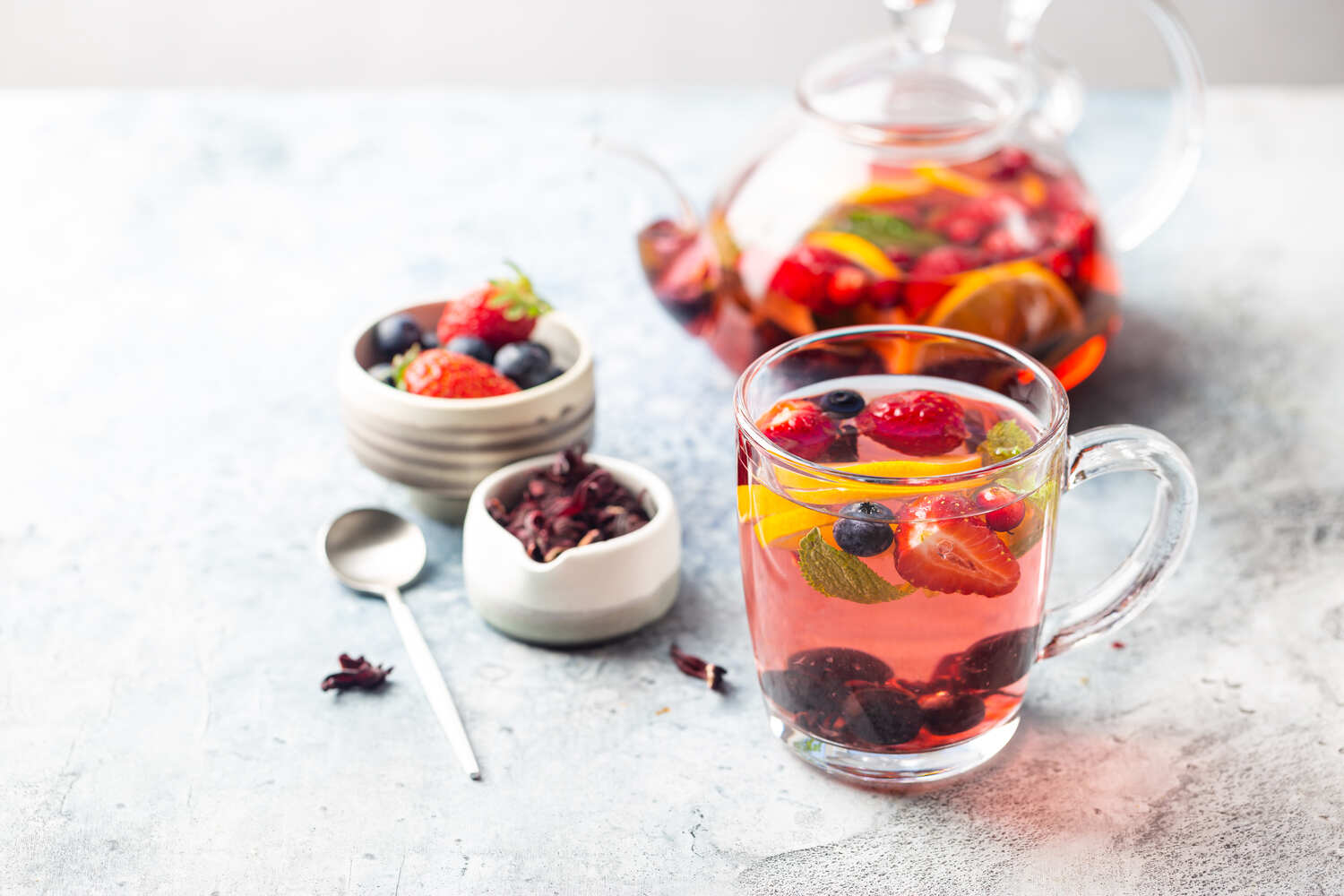
Tea made from fruits and berries like peach, raspberry, blueberry, etc. can be a great alternative to give to your toddler in place of traditional tea. Berries (18) are rich in antioxidants and are an excellent source of vitamins and minerals (19) as well. These teas will attract the kids with their vibrant colors and great fruity flavor. You can warm the water slightly and make fruit tea by infusing the fruit of your kid’s choice in that warm water. Take care as to keep the temperature of the water regulated and do not boil or over heat the water. Also, since the fruits are naturally sweet, these teas can be a great way to satisfy your little one’s sweet cravings at times.
2. Lemon Tea
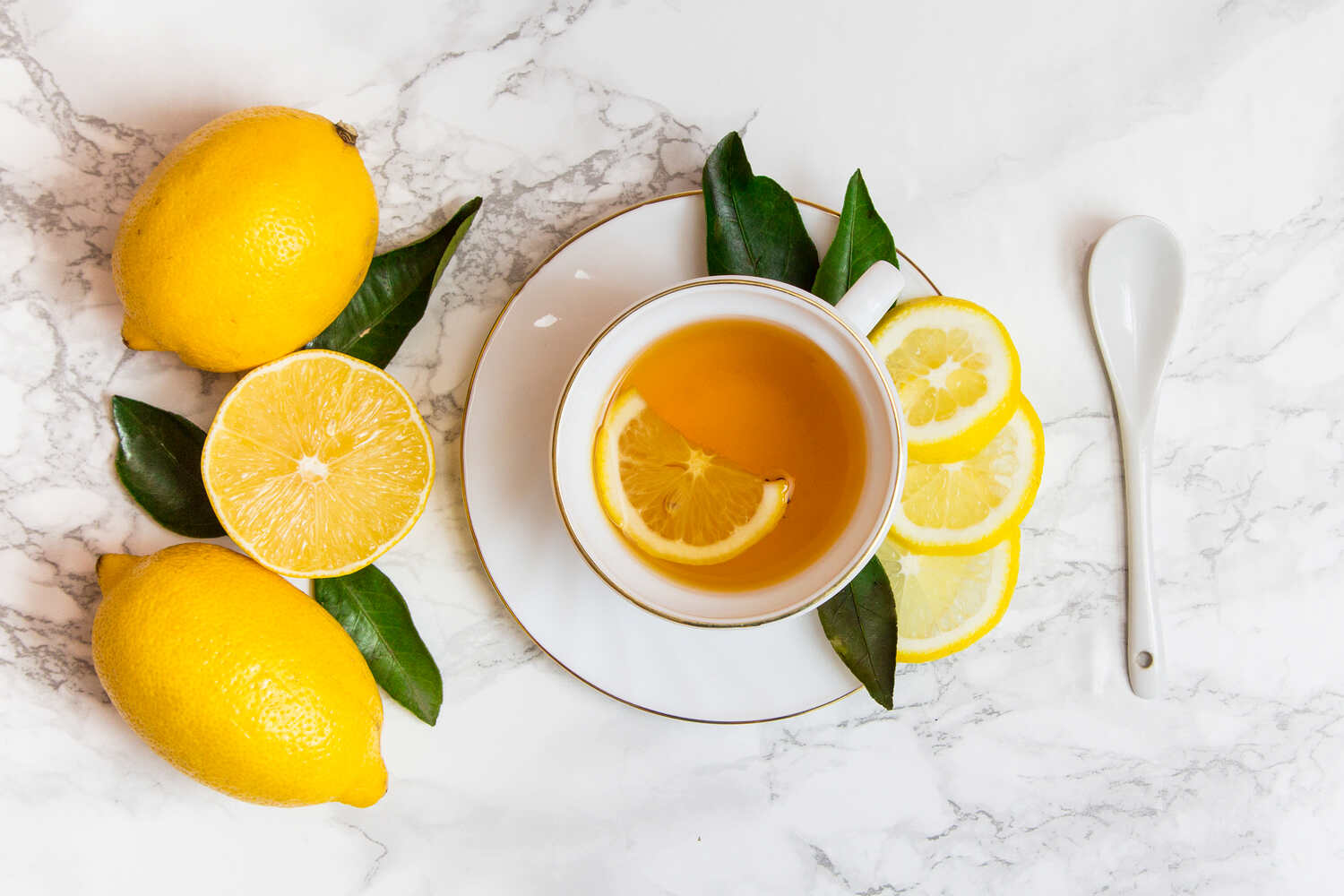
Lemon being rich in vitamin C (20) can be a good alternative and an excellent tea substitute to give to your toddler. You can simply warm some water, add few drops of lemon and little honey to it. Stir it well and give this warm ‘tea’ to your kid. Lemon and honey are a good flavor combination, which will surely be liked by your little one.
Though tea is considered a harmless beverage for toddlers, the process of preparing tea for toddlers is different from adults. There are many herbal teas available in the market, but to ensure a proper quality product, check the label properly and the contents in it. It is safe to introduce herbal tea to your kid after the age of 2 years. Also, it is always better to consult the doctor before giving anything to your toddler.
FAQ’s
1. Can I Give Tea to My Toddler?
If your baby is under the age of 6 months, do not introduce tea. The age recommendation for herbal tea is after they have crossed 8 months.
2. What Type of Tea is Best For Toddlers?
Tea that does not contain caffeine is preferred for toddlers. Caffeine is a stimulant and should be avoided for kids below 12 years of age. Even after that, the intake should be restricted to occasionally.
3. Is it Safe For Toddlers to Have Green Tea?
Green tea contains caffeine, which is a stimulant. Therefore, green tea is not suitable for toddlers.
4. Can I Add Sugar to an Herbal Tea to Give to My Toddler?
Sugar is not good for toddlers, and therefore, you must not add sugar or artificial sweeteners when making herbal tea for your toddler.
5. Can Toddlers Drink Tea Everyday?
It is generally not recommended for toddlers to drink tea every day due to potential caffeine intake and other considerations.
6. At What Age Can a Baby Drink Tea?
Babies under 6 months should not drink tea. After that, limited caffeine-free herbal teas might be considered under medical guidance.
References
- Caffeine and Children – [https://www.aacap.org/AACAP/Families_and_Youth/Facts_for_Families/FFF-Guide/Caffeine_and_Children-131.aspx]
- Herbal Supplements: Indications, Clinical Concerns, and Safety – [https://journals.lww.com/nutritiontodayonline/Abstract/2002/05000/Herbal_Supplements__Indications,_Clinical.9.aspx]
- Herbal Medicines for Gastrointestinal Disorders in Children and Adolescents: A Systematic Review – [https://publications.aap.org/pediatrics/article-abstract/139/6/e20170062/38796/Herbal-Medicines-for-Gastrointestinal-Disorders-in]
- Foeniculum vulgare Mill: A Review of Its Botany, Phytochemistry, Pharmacology, Contemporary Application, and Toxicology – [https://www.ncbi.nlm.nih.gov/pmc/articles/PMC4137549/]
- Traditional, Phytochemical And Biological Activities Of Elettaria Cardamomum (L.) Maton -A Review – [https://www.researchgate.net/publication/355412790_TRADITIONAL_PHYTOCHEMICAL_AND_BIOLOGICAL_ACTIVITIES_OF_ELETTARIA_CARDAMOMUM_L_MATON_-A_REVIEW]
- Herbal Supplements: Indications, Clinical Concerns, and Safety – [https://journals.lww.com/nutritiontodayonline/Abstract/2002/05000/ Herbal_Supplements__Indications,_Clinical.9.aspx]
- Ginger from Farmyard to Town: Nutritional and Pharmacological Applications – [https://www.frontiersin.org/articles/10.3389/fphar.2021.779352/full]
- Why Should Babies Not Have Honey? – [https://kidshealth.org/en/parents/honey-botulism.html]
- Chamomile: A herbal medicine of the past with bright future – [https://www.ncbi.nlm.nih.gov/pmc/articles/PMC2995283/]
- Risks and Benefits of Commonly used Herbal Medicines in México – [https://www.ncbi.nlm.nih.gov/pmc/articles/PMC2322858/]
- Assessing the Effectiveness of Mullein on Respiratory Conditions Such as Asthma – [https://www.researchgate.net/publication/308991417_Assessing_the_Effectiveness_of_Mullein_on_Respiratory_Conditions_Such_as_Asthma]
- Searching for Scientific Explanations for the Uses of Spanish Folk Medicine: A Review on the Case of Mullein (Verbascum, Scrophulariaceae) – [https://www.mdpi.com/2079-7737/10/7/618]
- Risks and Benefits of Commonly used Herbal Medicines in México – [https://www.ncbi.nlm.nih.gov/pmc/articles/PMC2322858/]
- Tea For Tots – [https://drlisawatson.com/tea-for-tots]
- A review of the bioactivity and potential health benefits of peppermint tea (Mentha piperita L.) – [https://onlinelibrary.wiley.com/doi/abs/10.1002/ptr.1936]
- Lemon Balm: An Herb You Must Have In Your Medicine Cabinet – [https://naturopathicpediatrics.com/2017/09/13/lemon-balm-herb-melissa-officinalis-dose-infant-children/]
- A combination of valerian and lemon balm is effective in the treatment of restlessness and dyssomnia in children – [https://www.sciencedirect.com/science/article/abs/pii/S0944711306000250]
- Berry Phenolic Antioxidants – Implications for Human Health? – [https://www.ncbi.nlm.nih.gov/pmc/articles/PMC5890122/]
- Raspberries, raw – [https://fdc.nal.usda.gov/food-details/2709281/nutrients]
- Vitamin C: Overview and Update – [https://journals.sagepub.com/doi/pdf/10.1177/1533210110392951]
Read Also: Tips on How to Cut Down on Sugary and Processed Foods in Your Child’s Diet

